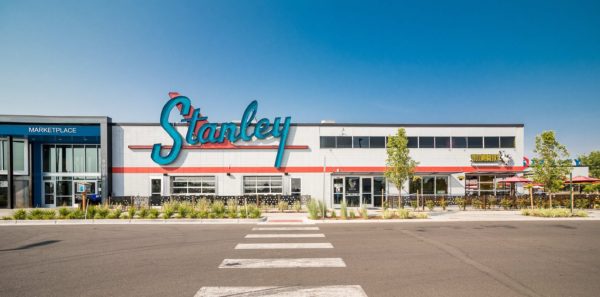
Stanley Marketplace is using its five-acre field to expand dining operations. (Courtesy Stanley Marketplace)
When pulling into Stanley Marketplace, it’s hard to miss the group of giant tents that have been erected behind the building.
As a result of strict reopening guidelines, the food hall on June 1 will open what it’s calling “The Backyard at Stanley.” Underneath the tents will be more than 60 tables (some of them giant wooden spools) and designated picnic areas, with at least six feet between each seating area.
“We’re going to have people check in so it won’t be communal seating, and a host will walk you to a table, and then when we’re done we will sanitize it and assign someone new,” said Mark Shaker, who co-founded both Aurora’s Stanley Marketplace and Broadway Market in Denver. “We’re fortunate to have so much land here.”
During the pandemic, food halls largely have closed or shifted to a takeout-only model. The tents are just one way that Stanley Marketplace and its counterparts, such as Shaker’s Broadway Market, and Zeppelin Development’s The Source and Zeppelin Station, are trying to ease into a world where social settings have to be carefully calculated.
“Food halls are the antithesis of coronavirus,” Shaker said. “They’re about bringing people close together, so to not have that connection has been challenging.”

Stanley Marketplace has designated picnic areas six-feet apart for customers looking to lounge in the field. (Lily O’Neill)
As of Wednesday, Stanley Marketplace is now open to the public with shortened hours, 11 a.m. to 7 p.m. Tuesday through Sunday. Shaker said the building will close Mondays for a deep cleaning, although some tenants will be able to keep operating.
Stanley Marketplace has kept up some operations during the pandemic, with about 10 restaurant concepts preparing meals for pickup and delivery. And the building’s tenant mix is largely the same as it reopens.
“Our arcade has not made it through the shutdown; it’s a tough time to be an arcade,” Shaker said. “But everyone else — 55 of the 56 tenants — has made it through the pandemic. “
Visitors to Stanley Marketplace must wear a mask at all times, and groups larger than 10 are not allowed. In order to maintain 50 percent capacity, Shaker said they’ve added door counters, and guests are also required to eat and drink outdoors.
“We’ve tried to be creative and innovative knowing that this is not just a short-term challenge, it’s a long term challenge, and we need to build assets that will last for years to come and not just a quick little Band-Aid,” Shaker said.
Broadway Market
Shaker said reconfiguring Broadway Market’s model has been a tougher challenge, mostly because the food hall isn’t surrounded by open land.
Broadway Market, located at the edge of the Golden Triangle, has been closed since mid-March. Shaker said the food hall will reopen the week of June 8, but only for carryout and delivery.
“It does not work for us to open and only have 50 people in there,” Shaker said. “The amount of labor and operational costs for what we get in return just does not make sense.”
Shaker said the food hall is still figuring out how many of the seven food concepts will open. They are working on a consolidated menu with some of the greatest hits from each concept.
He also added that the market is working on using the building’s adjacent parking lot in the evening or on weekends.
“It’s very challenging to plan accordingly when this could last four months or even 14 months,” Shaker said. “It’s one thing to have state and local guidelines, but what will people’s behavioral patterns be like? What will they feel safe and comfortable doing?”
Zeppelin Station
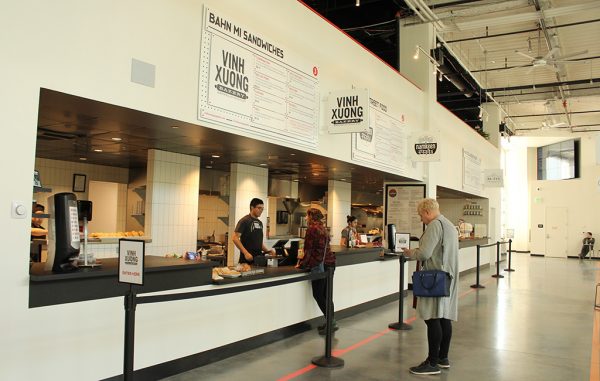
Zeppelin Station has submitted an application with the city to create an outdoor plaza in the surrounding area. (BizDen file photo)
Zeppelin Station plans to open dine-in services on June 1 for all of its eight vendors. The food hall has submitted an application with the city to create an outdoor dining plaza on the surrounding half-blocks of 36th and Wazee and is waiting for approval.
“The goal is to have almost 100 percent outdoor dining for the summer months,” said Marika Evanger, Zeppelin Station’s general manager. “The operational side of things would now include table service, which is unchartered territory for the world of food halls, but we have to adapt in order for people to feel confident and comfortable with us.”
Evanger said hosts will assign patrons a seat, and bartenders will take drink orders at tables.
“We want to make this experience easy on you and your party, and still allow you to enjoy what used to be communal space at a safe distance with us in the background taking care of the operational side of things that the customer would have done on their own before,” he said.
The Source Hotel + Market Hall
Many of The Source’s market hall vendors have been able to remain open for takeout and delivery during the statewide dine-in shutdown, including Smok barbecue and Grabowski’s pizza.
Because each food concept has its own space in the two market halls, totaling 45,000 square feet, each one will open on a case-by-case basis, according to Justin Croft, vice president of development for Zeppelin Development, which owns The Source and Zeppelin Station.
Some will utilize their space, such as Smok, which has submitted an application with the city to expand outdoor dining in the front parking lot by the original Foundry. Others, like Acorn, will continue with takeout and delivery for the foreseeable future. And those that are ready to open, such as Safta and Grabowski’s, will open dine-in services at 50 percent within the next week or so.
“Looking down the road, the future of food halls is bright after a vaccine and people start to feel safer,” Croft said. “We have lower-priced options, which is important in this economy, we offer variety, and we have something that’s approachable and comforting, so I think we are set up well.”
Correction: The days that Stanley Marketplace is open have been updated.

Stanley Marketplace is using its five-acre field to expand dining operations. (Courtesy Stanley Marketplace)
When pulling into Stanley Marketplace, it’s hard to miss the group of giant tents that have been erected behind the building.
As a result of strict reopening guidelines, the food hall on June 1 will open what it’s calling “The Backyard at Stanley.” Underneath the tents will be more than 60 tables (some of them giant wooden spools) and designated picnic areas, with at least six feet between each seating area.
“We’re going to have people check in so it won’t be communal seating, and a host will walk you to a table, and then when we’re done we will sanitize it and assign someone new,” said Mark Shaker, who co-founded both Aurora’s Stanley Marketplace and Broadway Market in Denver. “We’re fortunate to have so much land here.”
During the pandemic, food halls largely have closed or shifted to a takeout-only model. The tents are just one way that Stanley Marketplace and its counterparts, such as Shaker’s Broadway Market, and Zeppelin Development’s The Source and Zeppelin Station, are trying to ease into a world where social settings have to be carefully calculated.
“Food halls are the antithesis of coronavirus,” Shaker said. “They’re about bringing people close together, so to not have that connection has been challenging.”

Stanley Marketplace has designated picnic areas six-feet apart for customers looking to lounge in the field. (Lily O’Neill)
As of Wednesday, Stanley Marketplace is now open to the public with shortened hours, 11 a.m. to 7 p.m. Tuesday through Sunday. Shaker said the building will close Mondays for a deep cleaning, although some tenants will be able to keep operating.
Stanley Marketplace has kept up some operations during the pandemic, with about 10 restaurant concepts preparing meals for pickup and delivery. And the building’s tenant mix is largely the same as it reopens.
“Our arcade has not made it through the shutdown; it’s a tough time to be an arcade,” Shaker said. “But everyone else — 55 of the 56 tenants — has made it through the pandemic. “
Visitors to Stanley Marketplace must wear a mask at all times, and groups larger than 10 are not allowed. In order to maintain 50 percent capacity, Shaker said they’ve added door counters, and guests are also required to eat and drink outdoors.
“We’ve tried to be creative and innovative knowing that this is not just a short-term challenge, it’s a long term challenge, and we need to build assets that will last for years to come and not just a quick little Band-Aid,” Shaker said.
Broadway Market
Shaker said reconfiguring Broadway Market’s model has been a tougher challenge, mostly because the food hall isn’t surrounded by open land.
Broadway Market, located at the edge of the Golden Triangle, has been closed since mid-March. Shaker said the food hall will reopen the week of June 8, but only for carryout and delivery.
“It does not work for us to open and only have 50 people in there,” Shaker said. “The amount of labor and operational costs for what we get in return just does not make sense.”
Shaker said the food hall is still figuring out how many of the seven food concepts will open. They are working on a consolidated menu with some of the greatest hits from each concept.
He also added that the market is working on using the building’s adjacent parking lot in the evening or on weekends.
“It’s very challenging to plan accordingly when this could last four months or even 14 months,” Shaker said. “It’s one thing to have state and local guidelines, but what will people’s behavioral patterns be like? What will they feel safe and comfortable doing?”
Zeppelin Station

Zeppelin Station has submitted an application with the city to create an outdoor plaza in the surrounding area. (BizDen file photo)
Zeppelin Station plans to open dine-in services on June 1 for all of its eight vendors. The food hall has submitted an application with the city to create an outdoor dining plaza on the surrounding half-blocks of 36th and Wazee and is waiting for approval.
“The goal is to have almost 100 percent outdoor dining for the summer months,” said Marika Evanger, Zeppelin Station’s general manager. “The operational side of things would now include table service, which is unchartered territory for the world of food halls, but we have to adapt in order for people to feel confident and comfortable with us.”
Evanger said hosts will assign patrons a seat, and bartenders will take drink orders at tables.
“We want to make this experience easy on you and your party, and still allow you to enjoy what used to be communal space at a safe distance with us in the background taking care of the operational side of things that the customer would have done on their own before,” he said.
The Source Hotel + Market Hall
Many of The Source’s market hall vendors have been able to remain open for takeout and delivery during the statewide dine-in shutdown, including Smok barbecue and Grabowski’s pizza.
Because each food concept has its own space in the two market halls, totaling 45,000 square feet, each one will open on a case-by-case basis, according to Justin Croft, vice president of development for Zeppelin Development, which owns The Source and Zeppelin Station.
Some will utilize their space, such as Smok, which has submitted an application with the city to expand outdoor dining in the front parking lot by the original Foundry. Others, like Acorn, will continue with takeout and delivery for the foreseeable future. And those that are ready to open, such as Safta and Grabowski’s, will open dine-in services at 50 percent within the next week or so.
“Looking down the road, the future of food halls is bright after a vaccine and people start to feel safer,” Croft said. “We have lower-priced options, which is important in this economy, we offer variety, and we have something that’s approachable and comforting, so I think we are set up well.”
Correction: The days that Stanley Marketplace is open have been updated.
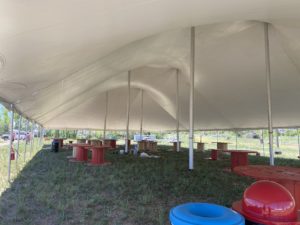
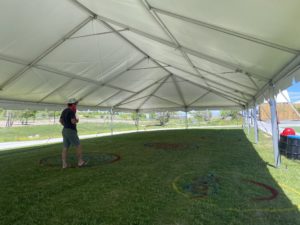
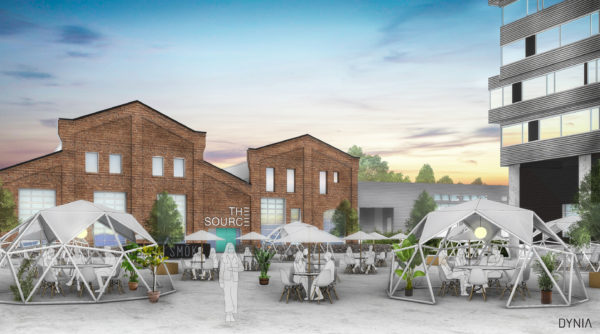


Sounds like a thoroughly well thought out plan. I’d offer a suggestion for ALL the eateries w table service. Have gloved “bussers” & “runners” handle ALL table clearing, so that wait humans/servers don’t clear or touch ANY finished dishes, beverage or stemware.